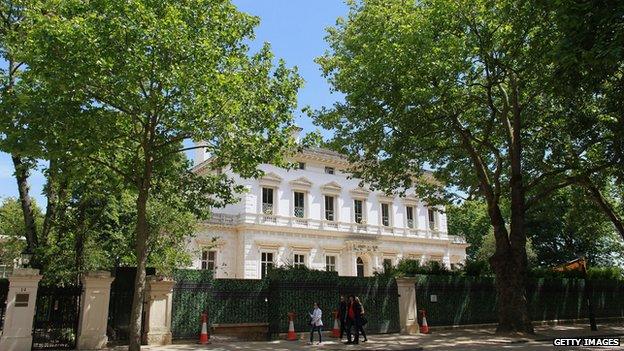Are non-doms bad for UK?
- Published
- comments

Among the UK's 120,000 or so non-doms, not all are tax-avoiding multi-millionaires and billionaires.
Some are foreign doctors or nurses recruited by the NHS, some are foreigners with skills badly needed by British companies, others are students - all of whom come to Britain for a while, often for the benefit of this country, but regard their homes as some other part of the world.
Ed Miliband says he does not want to send a signal to these non-doms that they are not welcome here.
So if he were to become prime minister, he would consult on establishing a maximum time period for those who come to work from abroad during which they would still have the ability to pay tax to the exchequer only on their UK assets and earnings - and they would still be able to pay no British tax on their overseas income and capital transactions.
The Shadow Chancellor Ed Balls said this morning on the Today Programme that he thought an appropriate threshold of two to three years - the length of what he called a normal university degree - would be long enough to separate legitimate temporary workers and students from those who may be unfairly exploiting the UK's tax rules to avoid paying their fair share of tax.
That relatively short cut-off period could cause some tension with tax experts, who argue it should probably be five years.
However most tax specialists concede that the UK's tax treatment of very wealthy people who are not really foreign in any meaningful sense is much more benign than for other big developed economies, especially the US.
The question is whether this is good or bad for Britain, economically and in a social sense.
Strikingly, the second after I spoke on the Today Programme about Labour's plan to abolish long-term non-dom status I was phoned by a banker I've known for years who said he was desperately worried that the reform would be hugely damaging for London.
How so?
Well he pointed to foreign tycoons such as Lakshmi Mittal who have moved to London and brought chunks of their multinational businesses here - and have therefore created useful employment.
He said that these tycoons would pack up and take their offices and spending power elsewhere if they had to pay tax on their global wealth.
That said, this banker also named some financiers and investors who were not foreign in any meaningful sense and whom he agreed had abused the non-dom rules. They had made fortunes in Britain but by the luck of where they were born or where they were based for a period were able to avoid paying their fair share of taxes.
Also for all the valuable work that is given to London based lawyers, bankers and accountants by non-doms, for all the money they spend on fashion and restaurants, there is the counter-argument that they have created ghettoes of the super-rich in Kensington and Chelsea, that have undermined the cohesion of the capital.

Kensington, central London: A ghetto for the super-rich?
Also, tax experts do not deny that the rules on who qualifies to be a non-dom are open to manipulation, or are just a bit arbitrary.
For example, a member of the super-rich who lives and works here, but whose father happens to be foreign, can take advantage of non-dom status, and pay little tax here on their global assets. Bizarrely, having a foreign mother doesn't normally confer the valuable non-dom badge.
Or if like the chief executive of HSBC Stuart Gulliver, someone works abroad for years (he worked in Hong Kong for the bank) that can deliver valuable non-dom status.
The simple argument against the non-dom rule is that it isn't fair, that anyone living in the UK and taking advantage of its public services and way of life should be subject to the same tax rules as the rest of us.
Strikingly the Dragons Den entrepreneur Duncan Bannatyne has argued, external that non-doms have an unfair cost advantage over other UK based business people.
As I said, the counter-argument is that the wealthier non-doms often make valuable employment-creating investments in the UK which generate prosperity for British people.
This is an argument that has raged for decades. Apparently the Treasury wanted to squeeze the non-doms as long ago as the 1980s, but Margaret Thatcher as prime minister vetoed this under pressure from Greek shipping tycoons.
There were allegations at the time that these magnates made donations to the Tory party - though this could not be proved because of the opacity of the party funding system.
Even today a tax specialist told me he thought shipping tycoons would quit Britain if Mr Miliband becomes prime minister - although he did not think they would relocate back to Greece, in its current parlous condition.
Over the two decades I've been looking at this issue I've been told many times by treasury officials they want to extract more tax from the non-doms but are persuaded that in doing so they would rob Britain of valuable job-creating investment.

Dragon's Den entrepreneur Duncan Bannatyne has argued that non-doms enjoy unfair advantages
That said, it is a bit counter-intuitive to argue that the non-dom rule encourages massive investment in Britain, because the moment a non-dom brings income onshore it becomes liable to tax.
Tories argue that non-doms would move to places like Switzerland. Dubai and Singapore if their UK tax privileges were abolished, and so would pay even less to the UK.
They point to the way that George Osborne as chancellor has taken other steps to increase revenue from non-doms, by for example increasing the annual charge introduced by the last Labour government on them - by which anyone who has been resident in the UK for seven out of the previous nine years has to pay £30,000 a year to keep the privilege, rising to £50,000 for those living here for 12 out of 14 years (the £50,000 will be increased to £90,000 in 2016).
The Treasury expects to generate more than £300m from these fees this year, up from £226m in 2012/13.
So how many non-doms would stay in Britain if they are forced to pay tax on their global earnings and capital gains? Would the exchequer emerge richer or poorer from Ed Miliband's proposed reform?
I am told by an adviser to non-doms that the older ones will tend to stay here, but the younger generation may depart.
He said however that it was impossible to assess with precision whether the costs of that exodus would outweigh the benefits of the higher tax yield from those who feel living in Britain matters more than avoiding tax.
Ed Miliband believes the net impact would be to raise several hundred million pounds a year for the Exchequer - which would be a useful sum but not one that would make a big dent in a deficit that was £90bn last year.
That said, for him it is less about the money than about the kind of society Britain should be.
Or to put it another way, this policy is probably more about political symbolism than fiscal science.